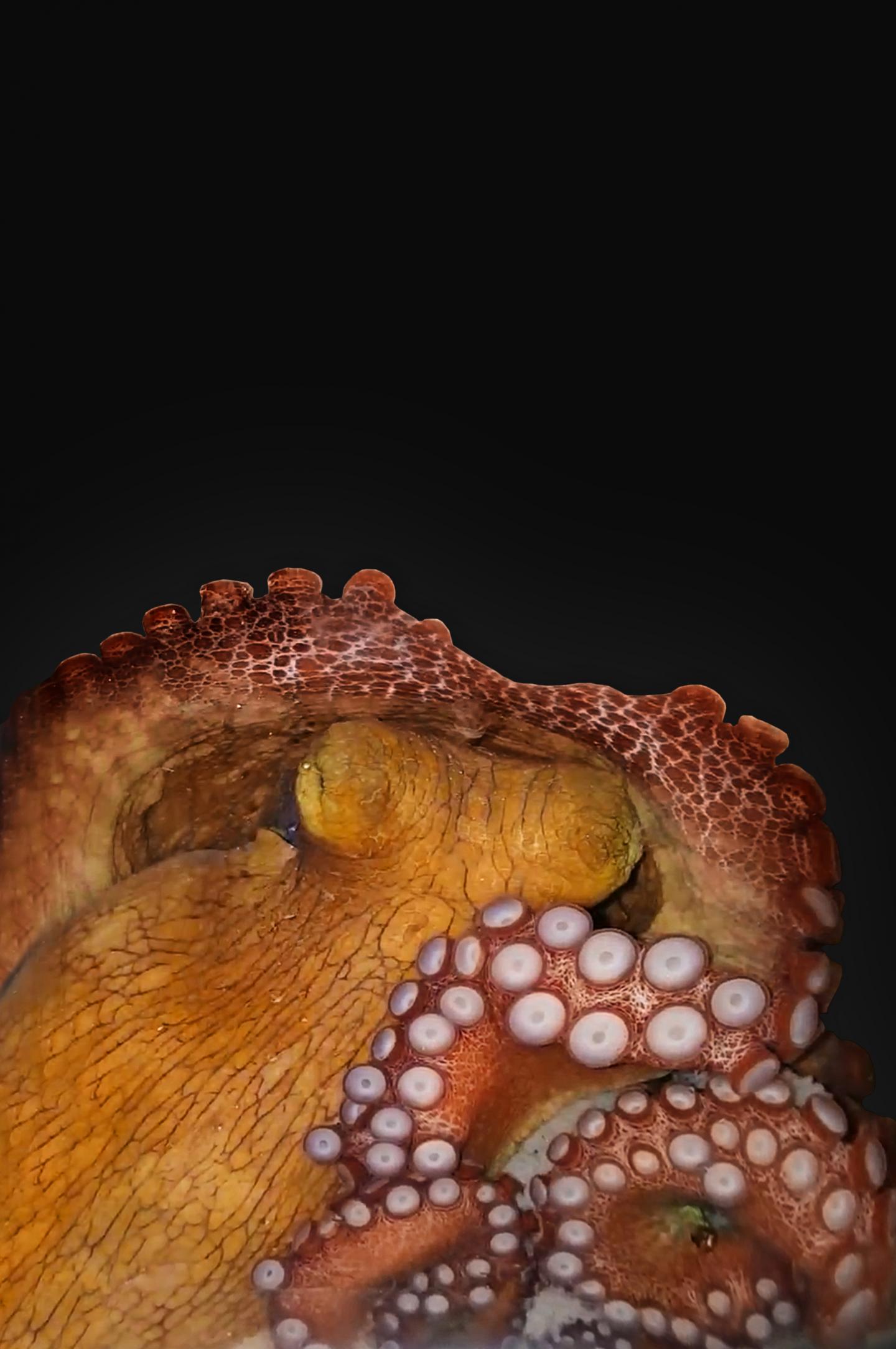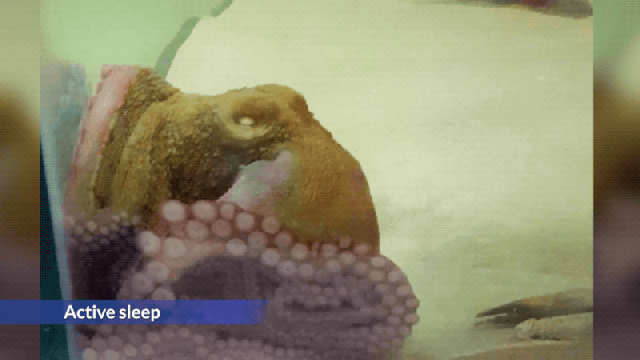Two years ago, a PBS documentary video showed an octopus named Heidi in what appeared to be an active dream state. Her arms twitched as she slumbered, and her skin flipped wildly through all sorts of alien textures. Most dramatically, however, the cephalopod changed colours, flashing in greens and reds like a malfunctioning billboard.
Many interpreted these behaviours as dreaming, but it was hard to tell, given how little we know about cephalopod brains and, to a certain extent, cephalopod intelligence (as much as intelligence can be tied to dreaming, which isn’t a given).
New research published today in iScience takes us an important step closer to the truth by documenting two alternating sleep states in octopuses. That these aquatic invertebrates dream was not proven in the new study, but it does show that octopuses engage in sleep states closely analogous to the non-REM and REM sleep observed in mammals and birds, the latter of which is associated with dreaming.
“This is a significant extension of the analysis of octopus sleep,” Dan Margoliash, a professor in the Department of Psychology at the University of Chicago who wasn’t involved in the new study, said in an email.
Sylvia Medeiros, the first author of the new paper and a Ph.D. student enrolled in the Neuroscience Graduate Program of the Federal University of Rio Grande do Norte in Brazil, investigated sleep in octopuses because it “gives us a vantage point for the psychological and neurobiological comparison with vertebrates, since the octopus possesses several sophisticated cognitive features that are only seen in some vertebrate species but with a very different brain architecture,” she wrote in an email.
Indeed, cephalopods have cognitive wiring that’s very different from ours. They’re equipped with neural structures known as lobes, including a vertical lobe associated with long-term memory and some features reminiscent of the mammalian hippocampus, which is linked to complex learning. Approximately two-thirds of an octopus’s neurons are in their arms, resulting in a distributed nervous system that allows their limbs to function independently from their brain. They can even taste with their arms.
[referenced id=”1524334″ url=”https://gizmodo.com.au/2020/10/researchers-finally-figured-out-how-octopuses-taste-with-their-tentacles/” thumb=”https://gizmodo.com.au/wp-content/uploads/2020/10/30/f8yzsyplqhdk2imhkl0m-300×169.jpg” title=”Researchers Finally Figured Out How Octopuses Taste With Their Tentacles” excerpt=”Octopuses, with their eight suction-cup-covered tentacles, can taste objects simply by touching them. A team of researchers has finally figured out how these cephalopods are capable of pulling off this remarkable trick.”]
At the same time, octopuses are super smart, exhibiting sophisticated behaviours and problem-solving abilities. They can use tools to avoid predators and change the colour and texture of their skin for the purpose of camouflage, which they do by capturing and processing information from their surroundings. Incredibly, they also respond to the drug MDMA in a very human-like way. Evolution, it would appear, has found multiple ways of achieving intelligence.
There’s “a lot to learn by studying the nervous system of these animals,” said Medeiros. An improved understanding of octopus brains can shed new light on our own brains, she said, “because in order to understand how the nervous system works in general, it is essential to compare across different examples.”

For the new study, Medeiros and her colleagues captured video recordings of four octopuses, all Octopus insularis, in a laboratory setting. Ideally, the researchers would’ve taken electrophysiological readings, as is done on sleep studies with mammals, birds, and reptiles, but due to exploratory octopus behaviour — they like to touch, push, and pull objects — and their soft, boneless bodies, “it is very difficult to attach electrodes in order to record the signal directly from their brains,” said Medeiros.
Another challenge was to make sure the octopuses were actually asleep and not exhibiting some unknown waking behaviours. To do so, the scientists exposed the cephalopods to visual and tactile stimulation during all stages of the test.
“For the visual stimuli we used a computer screen with a video showing live crabs moving, which [we] initiated remotely,” said Medeiros. “For the vibratory stimuli, a rubber hammer was attached to the aquarium’s upper corner and tied to a nylon wire which passed to the experimenter’s room through a window. This wire had four marks so that pulling it up to one of these marks would set the hammer at [multiple angles] to hit the aquarium wall with four different, increasing intensities.”
Rude, but that’s science. But as these actions showed, it took extra stimulation to evoke behavioural responses in the octopuses, strongly indicating that the animals were indeed asleep.
The resulting video recordings showed the octopuses transitioning between two distinct stages of sleep. During the first stage, known as quiet sleep, the octopuses featured pale skin and contracted eyes. Quiet sleep tended to last for around seven minutes and was followed by active sleep, which lasted for around 40 seconds on average. During active sleep, their skin changed colour and texture, their eyes moved, and their arms and bodies twitched. The entire sleep cycle was shown to repeat in 26- to 39-minute intervals.
The discovery of two distinct sleep states was interesting, but so too was the periodicity. The finding reveals striking similarities between the sleep states of vertebrates and cephalopods, groups which diverged from a common ancestor some 500 million years ago. The similar sleep patterns are likely not a retained characteristic from the ancient past, but something that emerged independently among the different lineages. The similarities observed among cephalopods and vertebrates are “probably a consequence of similar selective pressures related to the very taxing cognitive loads experienced by these separate groups of animals,” said Medeiros.
The presence of an active, REM-like sleep state is also notable, but it’s “not possible to affirm that they are dreaming, because they cannot tell us that,” explained Medeiros. That said, the new results suggest that, during active sleep, octopuses experience a state “analogous to REM sleep, which is the state during which humans dream the most.”
If octopuses are in fact dreaming, it’s “unlikely that they experience complex, symbolic plots like we do,” she said. The active sleep stage in octopuses is very short — typically from a few seconds to a full minute — but if any dreaming is going on, “it should be more like small video clips, or even gifs,” said Medeiros.
Margoliash hopes the new paper will encourage future research in order to “seek independent validation” of the results and to include more specimens and different octopus species.
“The distinct quiet and active forms of octopus sleep reported is a good invertebrate example of the existence of complex sleep structure,” he explained. “Such sleep structure is most fully expressed in birds and mammals. Given the generality of these results across such a broad range of animals, it raises central questions.”
Specifically, Margoliash would like to know which particular feature of nervous system tissue requires “complex regulation of physiology during sleep” and how this relates to an “animal’s daytime behaviour and ultimately to its fitness.” To which he added: “Studying complex sleep in a broad range of animals” might help us to solve these “deep and fascinating questions.”
Looking ahead, Medeiros and her colleagues would like to further investigate octopus sleep to see if it serves physiological functions like metabolic detoxification and cognitive processing, which is the case in mammals. And importantly, the team would like to take on the difficult task of “recording electrophysiological data from the octopus across the sleep-wake cycle,” said Medeiros.
That would be amazing, if they can pull it off. Much about octopuses remains a mystery, but slowly and methodically we’re uncovering their many secrets.
